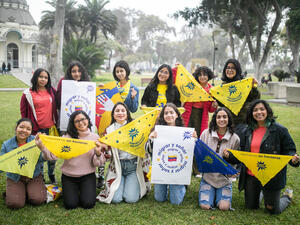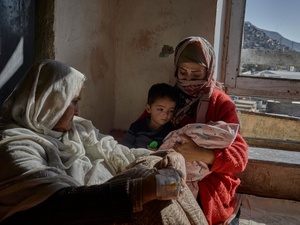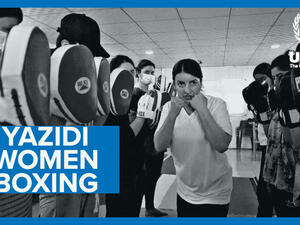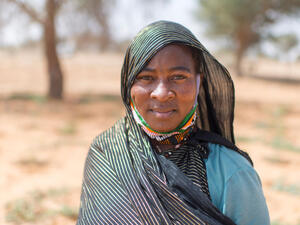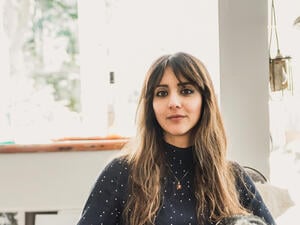UNHCR lends woman's touch to Pakistan's relief camps
UNHCR lends woman's touch to Pakistan's relief camps

Zainab Fazal Hussain, a member of UNHCR's community services teams in northern Pakistan, talks with women in Kuchaen Saeedan Camp set up after the October 8 earthquake to learn about their special needs.
MUZAFFARABAD, Pakistan, Jan 13 (UNHCR) - In emergency situations, where out of sight often means out of mind, people who are unable to stand up for themselves risk being left by the wayside - whether women, children, the elderly or the disabled.
In quake-hit Pakistan, where women prefer the privacy and safety of their tents, discovering their problems and needs is a major challenge that the UN refugee agency is trying to tackle in a culturally sensitive way.
"Helping earthquake survivors is a unique and unforgettable experience," says Zainab Fazal Hussain, who came from the UNHCR office in Pakistan's southern port city of Karachi to help earthquake survivors in Muzaffarabad, the capital of Pakistan-administered Kashmir in the far north.
As part of the UNHCR community services team, Zainab keeps an eye on the facilities for women in the emergency camps set up after the 8 October earthquake and reports difficulties back to the office in Muzaffarabad.
"Women have special needs and certain special groups like single mothers, widows and the disabled may have problems getting access to different services and relief items," she says.
"We have formed 27 women's committees in camps to look after these needs and are in the process of forming more. Each committee has female volunteers in the camps who go around and talk to women, identify problems and discuss them with aid workers to find solutions."
As the lead agency for camp management under the overall UN effort, the UN refugee agency is supporting the Pakistan authorities in 144 relief camps - 26 of them planned and 118 spontaneous sites - hosting some 140,000 people in North-West Frontier Province and Pakistan-administered Kashmir.
Aid workers, whose activities were disrupted by storms at the start of the month, are bracing for further snow and rain and have intensified their winterization drive in the camps. Additional camps have also been set up in case there is a fresh exodus from higher elevations by people who have so far stayed on despite the loss of their homes.
Each day Zainab and members of partner organizations try to reach more camps around Muzaffarabad to help set up women's committees and explain the role they have to play.
"At the moment," says Nighat Naqvi, a resident of Kochaey Saeedan camp in Kashmir's Jhelum valley, "we don't have proper bathrooms for women, there's no place to wash clothes and no proper water system in place. At times women in the camp have to walk down to the river from the camp to wash clothes."
She adds: "We have more than 400 people in the camp but there are no arrangements to take care of women. Setting up a women's committee and talking to UNHCR about our special needs will improve the situation."
Morgan Morris, UNHCR's team leader in Muzaffarabad, says the agency is also strengthening the ability of local non-governmental organisations to provide services to earthquake survivors: "Our community services experts have had several training sessions with different partner organizations, helping them to understand the camp aspects and apply them in the field."
For Zainab, her job doesn't end when she leaves the earthquake survivors in the tent camps; everyone in the region was affected and she has to counsel a female co-worker on the drive back.
"It's good to talk to someone about the terrible experience you've been through. This will help you to overcome the trauma," she tells Maria Bibi, a social mobiliser with UNHCR partner BEST.
"The earthquake completely destroyed our home and now we are sleeping in a tent pitched right in front of our house," says Maria. "My 24-year-old brother goes out of his senses every now and then and we can't do anything about it. And my mother lost a sister."
Zainab's sympathy and advice brings some relief to Maria but for many in Pakistan the earthquake has changed everything.
"I was a final year student doing a Masters in Microbiology and now I have no interest left in my studies," says Maria. "I am just too scared most of the time."
By Babar Baloch in Muzaffarabad, Pakistan



